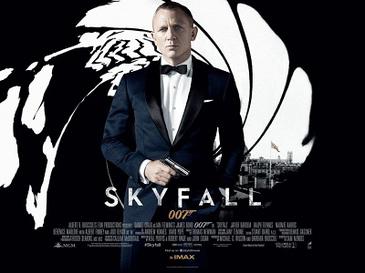After
being shot in the line of duty, MI6 agent James Bond (Daniel Craig) fakes his
own death in order to enjoy retirement. But when MI6 is attacked by
cyberterrorist Raoul Silva (Javier Bardem) and undercover agents are
compromised, Bond jumps back into the fray. Meanwhile, MI6 director M (Judi
Dench) faces political pressure from soldier-turned-bureaucrat Gareth Mallory
(Ralph Fiennes), who urges her to retire with dignity. The ante is upped when
Silva’s highly personal motivation is finally revealed.
Skyfall
marks the fiftieth year of the cinematic James Bond franchise, and in many
ways, it’s the ultimate reflection on the 22 films that preceded it. Like any
Bond movie, it offers the requisite tuxedoes, gunplay, Bond girls, car chases,
and quips. It also offers some overt visual cues – think shaken martinis and a
well-preserved Aston-Martin – that evoke the franchise’s history. But what
truly makes Sam Mendes’ film more than just another entry in the series is the
way it synthesizes past and present while offering a vision for the future.
Skyfall
finds both Bond and MI6 at a crossroads. Both are damaged physically (Bond by
gunfire, the agency headquarters by explosion) and both face tough questions
regarding their necessity in the 21st century. M is dragged before a
committee that views her as a Cold War relic while a young new Q (Ben Whishaw) haughtily
informs Bond that he can accomplish more from his computer than 007 can in the
field. This sense of pending obsolescence is compounded by a villain who brings
technological savvy to a dangerous new level. And yet the film continually
reminds us – through both gratuitous catchphrase dropping and the characters’
fortitude – that sometimes, the old ways are best.
However, to reduce Skyfall to a mere glorification of the past
would be to ignore its other thematic lesson: past decisions often breed future
consequences. Whether it be M’s protect-the-greater-good approach to her
operatives’ safety or Bond subjecting himself to tons of physical and
psychological harm or a former agent’s botch suicide via cyanide pill, the
effects are on full display here, and they are far from pretty.
Nevertheless, the quest for depth
and relevancy does not render Skyfall
a boring film. From the opening pursuit to the (literally) explosive finale,
there are places when the film slows, but it never stalls out. The action is aided
by one of the best Bond casts in years. Craig, whose casting I once found objectionable,
has clearly grown into the role, and his weary, cynical, but ruthlessly
effective take on the character is a good fit for the plot. M is given
considerably more screen time here, something that both fleshes out the
character and allows Dench to shine. As the antagonist, Bardem pulls out a
performance that no one else (save for maybe Christoph Waltz) can match. The
bleach-blond Silva is a refreshing break from the stale megalomania of villains’
past. Here, he uses innuendo-laden frivolity as a mask for bloodlust and psychosis,
and he does so disturbingly well.
By the end of the proceedings, an
era has ended and a new guard has been ushered in. This includes resurrecting
certain legacy characters, a move that would have been regarded as cheap in
lesser hands. But Mendes and his collaborators ultimately show that a key
component of Bond’s refusal to die is his – and the franchise’s – ability to
change.
8.5/10

No comments:
Post a Comment